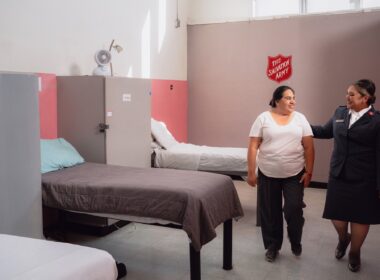Veterans find transitional help through Portland Harbor Light Shelter.
The Salvation Army’s Veterans Emergency and Transitional Shelter (VETS) serves up to 48 veterans in a transitional residential treatment facility. The program is designed to help veterans, who are honorably discharged and are now homeless, move back into the community. These individuals receive case management, nutritious meals, substance abuse and mental health treatment for up to nine months at the Harbor Light, located on SW 2nd in downtown Portland. Presently 24 extended families are involved in the program.
Lieutenant Ron Owens, Director of The Salvation Army Harbor Light Center and Tim Montague, Social Service Representative of the Department of Veterans Affairs, work together to assist the veteran to stabilize and move into permanent housing in the community.
“A unique aspect of the VETS program,” said Owens, “is that we are able to accommodate both men and women and also the family of the veteran. The center will house, clothe, feed and do case management for the spouses and children of the veterans while they remain in the VETS program. Many of those returning from Operation Iraqi Freedom and Operation Enduring Freedom find themselves without resources to adequately care for their families. Many vets live in their cars or vans, with their children, while looking for work. They would not consider entering a program and leaving their children out in the cold. The VETS program goes the extra mile in serving both the soldier and his family.”
James Patrick Meiser, a graduate of the program, wrote to Harbor Light as follows: “I was introduced to you by my caseworker at Central City Concern. At the time I had just been released from jail, cold, hungry and sick. I had but one thing in mind and that was to kick my drug habit. The first thing you told me was to eat and then go to bed and get well. All the time I was there the most frequently asked question was ‘How can we help you?’ And help you did. You gave me a place to stay, food, clothes, and most of all encouragement. Thank you for making me so welcome. And for the hope you gave in my recovery. Without your help, I feel my success would not have happened.”
In January 2007, as reported previously in New Frontier (February 12, #3), the White House Office of Faith-Based and Community Initiatives recognized the VETS program as a “Champion of Compassion,” with these words: “The White Office of Faith-Based and Community Initiatives acknowledge the compassion that is the heart of your effort, the understanding that is it soul and the dedication that is it strength,” signed by the director, Jay Hein.
Owens commented: “The Salvation Army is seeking community support for these veterans and their families. I am looking for churches or service groups who would like to partner with us by providing volunteers, various hygiene items and financial support. I would welcome calls from pastors interested in working with The Salvation Army in serving these good people.”
To learn more about the Harbor Light Shelter, log on to www.tsacascade.org.









